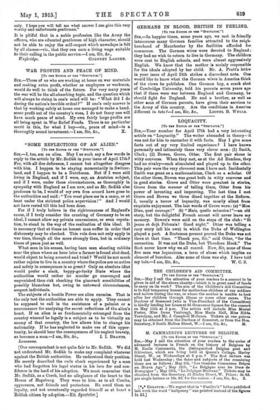LOQUACITY.
(To THE EDLTOlt OF 281 Sra,—Your number for April 17th had a very interesting article on " Loquacity." The writer abounded in theory—it was not for him to encumber it with facts. May I give some facts out of my very limited experience ? I have known personally and intimately these very clever men: (1) Smith, Clark ; (2) Bowen, Grove, Otter. The first pair shone is witty converse. When they met, as at the Ad Eundem, they had no rivalry—each stimulated and played up to the other. This pair were the very cleverest men 1 have met. Incidentally Smith was great as a mathematician, Clark as a scholar. Of the other three, Bowen was great both in witty converse and in good stories. Grove and Otter were greatest in stories, Grove from the manner of telling them, Otter from his power of inventing and improving. The last time I met Grove and Bowen we three dined together at the Reform. I, usually a terror of loquacity, was mostly silent from exquisite enjoyment. The last words of Grove were: (a)" Mon Dien, quel courage!" (b) Mais, quelle memoirs 1"—an old story, but the delightful French accent will never leave my memory. Bowen's were said on the steps of the club : " jeune et dejl Polonais! Good night." Otter was telling a racy story (all his own) in which the Duke of Wellington played a part. A Scotsman present proved the Duke was not there at that time. " Thank you, Sir," said Otter, "for the correction. It was not the Duke, but Theodore Hook." The Scot never knew why we all roared. Now, Sir, none of these five men was loquacious, a term of abuse which implies an element of boredom. Also none of them was shy. I have told


































 Previous page
Previous page